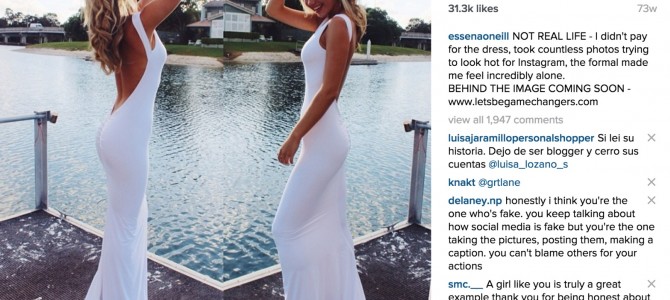Here’s a term you might not know, unless you are a part of Generation Y, the most social-media savvy generation: “Instagram Model.” An Instagram model is a good-looking woman (or man) who has built a large social media following by posting pictures of herself online. The pictures are usually sexy or artsy and well-crafted. The most successful Instagram models might even have sponsorships to wear or advertise certain brands.
Recently, Australian Instagram star Essena O’Neill announced she was quitting. In a compelling YouTube video, the 19-year-old said she was done pretending to be perfect and measuring her success by the attention she got online. She felt that she had become a part of setting unrealistic beauty standards for young women like her 14-year-old sister, and that she wanted to focus more on “real life” off the computer.
Don’t Blame Social Media—Or Men
The phenomenon of Instagram modeling is the confluence of several factors: Women (and men) possess an innate desire to be admired and liked. Modern technology allows anyone to edit or “filter” photos to make himself or herself more attractive. And the Internet provides immediate access to thousands of people via social media.
Certainly, we can all wish O’Neill the very best in her life offline, but it may be that leaving social media oversimplifies the real issue here. Yes, technology has put a new twist on an age-old struggle, but the reality is that women (and men) have struggled with appearance and seeking others’ approval since the dawn of time.
It would be another oversimplification to say that we live in a sexist, patriarchal society that holds women to a different standard than men. It may be true that women’s appearances (their hair and makeup, fashion choices, age) get more attention than men’s, but we can’t just blame men for this. Often, it’s women who are putting pressure on ourselves to look a certain way. It may be a natural or evolutionary instinct for women to try to look young and beautiful.
Keeping a Natural Desire in Check
Not all of this is bad. The desire to put our best selves forward and to make the effort to present ourselves well can actually be a good thing. It can be our way of showing someone else, at a job interview or on a date, that we care about him or her and his or her opinion of us.
Those who reject overbearing beauty standards sometimes swing the pendulum in the opposite direction, swearing off makeup completely and going around with unkempt hair and clothes.
The challenge for everyone is to find balance in this difficult area. There’s no shame in wanting to be physically attractive, but we should work to keep this desire in perspective. Unchecked, this desire to be attractive can turn into vanity in ourselves or envy of others. Our looks shouldn’t be where we find our identity. Neither should we look for our identity in others’ opinions, whether about our looks, jobs, achievements, or anything else.
Examining Where We Look for Identity
O’Neill recognized that her Instagram account was causing her trouble in this area. It’s admirable that she saw the disconnect between her authentic self and the representation of herself online, and wanted to speak out about that. Going offline may have been a positive or necessary step for her. Another option might have been to continue using social media, but to tame her own heart to depend less on the “likes” or clicks generated by her photos.
Each of us should examine what influences we allow to shape our identity. We all have a choice about how to respond to modern opportunities to interact online.
Let’s all give ourselves some grace when it comes to the way we look and the way we want others to see us: It’s human nature to want to seek approval and to be liked. But it’s not the approval of others that ultimately defines who we are, on the Internet, or off. Recognizing this truth is ultimately freeing… even more freeing that deleting an online account.









